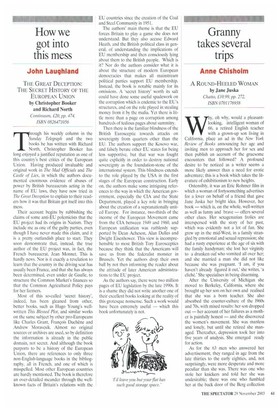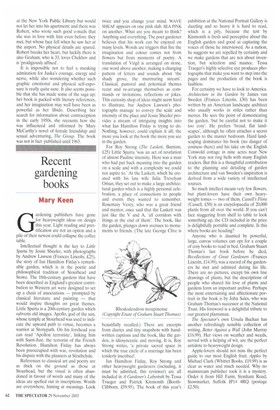Granny takes several trips
Anne Chisholm
A ROUND-HEELED WOMAN by Jane Jnska Chatto, £10.99, pp. 27Z ISBN 0701176938 W6Iy, oh why, would a pleasantlooking, intelligent woman of 6, a retired English teacher with a grown-up son living in California, place an ad in the New York Review of Books announcing her age and inviting men to approach her for sex and then publish an account of the gruesome encounters that followed? A profound desire to be noticed as a writer seems a more likely answer than a need for erotic adventure; this is a book which takes the literature of exhibitionism to new heights.
Ostensibly, it was an Eric Rohmer film in which a woman of fortysomething advertises for a lover on behalf of a friend that gave Jane Juska her bright idea. However, her book — which is, on the whole, well-written as well as funny and brave — offers several other clues. Her sexagenarian frolics are interspersed with the story of her past, which was evidently not a lot of fun. She grew up in the mid-West, in a family strangled by emotional and sexual repression; she had a nasty experience at the age of six with the family handyman; she lost her virginity to a drunken oaf who vomited all over her; and she married a man she did not like because she was pregnant. 'I am, if you haven't already figured it out,' she writes, 'a cliché.' She specialises in being disarming.
After the University of Michigan she moved to Berkeley, California, where she brought up her son on her own and realised that she was a born teacher. She also absorbed the counter-culture of the 1960s and 70s, with mixed results: her son dropped out — her account of her failures as a mother is painfully honest — and she discovered the women's movement. She was manless and lonely, but until she retired she managed. Thereafter, depression took her into five years of analysis. She emerged ready for action.
As for the 63 men who answered her advertisement, they ranged in age from the late thirties to the early eighties, and, not surprisingly, were more desperate and more peculiar than she was. There was one who stole her knickers and told her she was undesirable; there was one who fumbled her at the back door of the Berg collection at the New York Public Library but would not let her into his apartment; and there was Robert, who wrote such good e-mails that she was in love with him even before they met, but whose face fell when he saw her at the airport. No physical details are spared. Robert breaks her heart, but luckily there is also Graham, who is 33, loves Chekhov and is 'prodigiously affixed'.
It is impossible not to feel a sneaking admiration for Juska's courage, energy and nerve, while also wondering whether such graphic emotional and physical self-exposure is really quite sane. It also seems possible that she has made some of the saga up; her book is packed with literary references, and her imagination may well have been as powerful as her libido. Describing her search for information about contraception in the early 1950s, she recounts how she was influenced and informed by Mary McCarthy's novel of female friendship and sexual adventuring, The Group. The book was not in fact published until 1963.



























































































 Previous page
Previous page